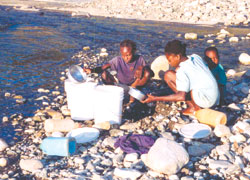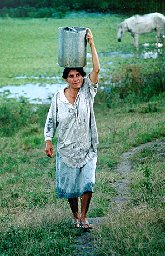Gender and Water
The Connection Between Gender and Water
Although in the world of water policies there is very little attention paid to the issue of gender and water, it is a connection that is very critical and when addressed, results in generally fairer and more effective water resources management.
When it comes to the domain of water, in most of the world (including the Caribbean region) there are very segregated roles for women, men, and children. Women (and children) generally take on the reproductive or private sphere which means that water use is designated most of the time for the household, whereas men are occupied with the productive or public sphere which allocates water for irrigation purposes. This type of division is overtly simplistic, as it misses the connections between the two spheres.

During times when accessing water means more than opening a tap (using community faucets, water trucks, irrigation ditches, rivers, wells, etc.), women's responsibilities tend to take a lot of energy, money, and most especially time. When water is not easily accessible these tasks become hardships, as someone must go collect water whenever it appears, bring the water home in heavy containers and in multiple trips, move the water from larger bins to smaller ones, ration water incase it is not always available, and heat the water for laundry, bathing, or cooking. The person responsible for these activities is almost always a woman or a child. Although women have such a close and intricate relationship with water, their needs are seldom taken into account when developing a strategy for water resources management. They are not given a voice, and thus obtaining water remains a struggle.
Women With Respect to the Dublin Principles and the MDG
Explicit recognition of the role that women play in water resources management has been made in the third Dublin principle, which states that "Women play a central part in the provision, management and safeguarding of water". Gender is also addressed as part of the Millennium Development Goals (MDG), that sees to "Promote gender equality and empower women". Promoting gender equality and making water resources more accessible to women and children will also add to other MDG such as eradicating extreme poverty and hunger, and achieving universal primary education. If women and children spent less time doing the various water-related tasks that they engage in, children could spend more time in school, and women could spend more time participating in activities that could generate an income, thereby decreasing poverty. Water is a central aspect of development, thereby a crucial aspect to increasing the quality of life of millions of people.

How CARIWIN Will Address Gender and Water Resources Management
CARIWIN will contribute to CIDA’s gender equality objective of advancing women’s equal participation with men as decision-makers by involving national women’s departments, the UWI Gender Studies Centre, GWA and CAFRA in water sector policy dialogue. CARIWIN will contribute to reducing the gender inequalities in access to and control over resources and benefits to development, by ensuring that gender issues are taken into account in the development of new decision-making tools, and that women are promoted in non-traditional areas of water sector management through training.